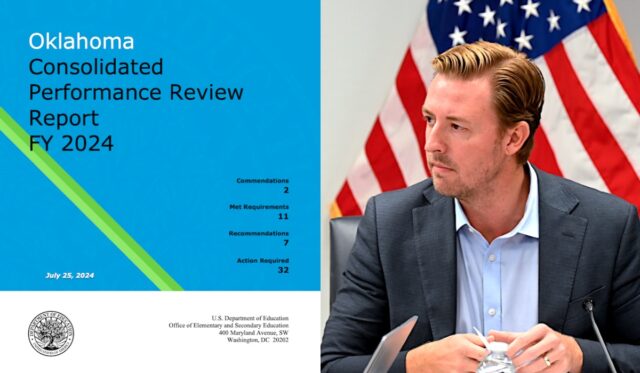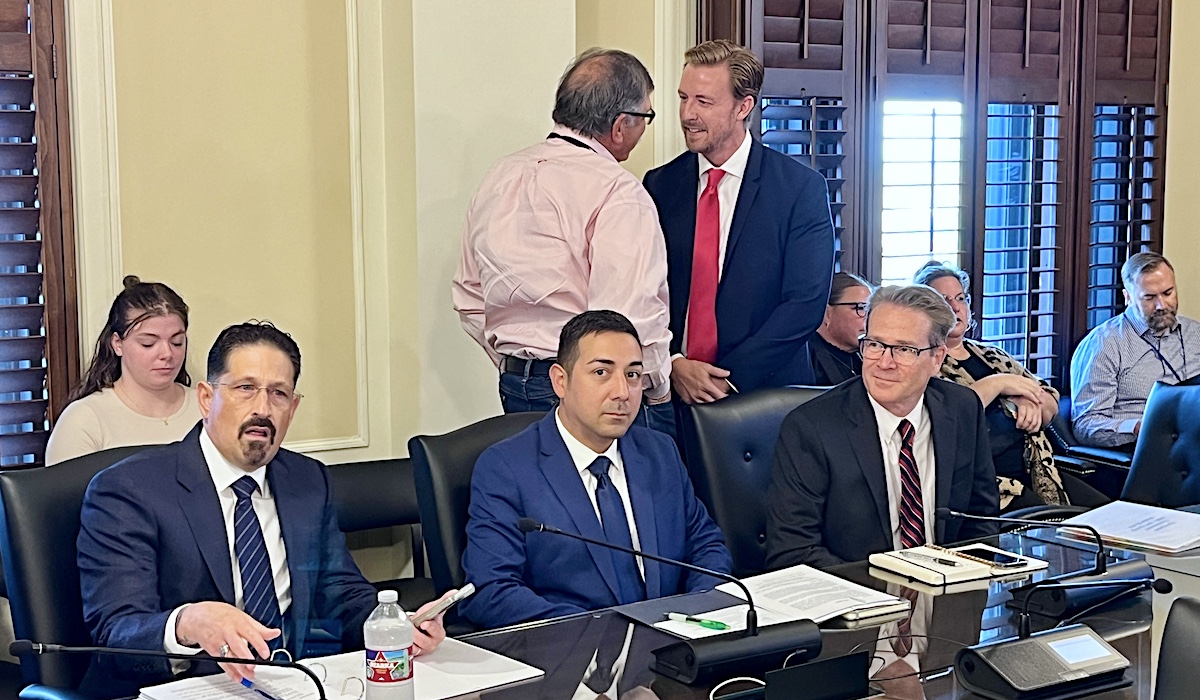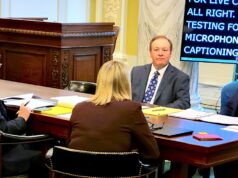

In a tweet congratulating Linda McMahon on her nomination as U.S. secretary of education by President-elect Donald Trump, Oklahoma Superintendent of Public Instruction Ryan Walters urged the former wrestling executive to “get to work dismantling the Department of Education” — the same department that recently identified 32 areas of concern with the way Oklahoma handles federal grants.
Months after the U.S. Department of Education set multiple deadlines for the Oklahoma State Department of Education to make numerous changes to its handling of federal grants, those deadlines have now passed. OSDE officials say they made the requested changes by the deadlines, and additionally, state-level oversight has spurred more robust communication with the state Legislature.
Still, some officials have expressed concern for the high number of apparent deficiencies that were outlined in the U.S. Department of Education’s “Consolidated Performance Review Report.”
“It sure doesn’t make you very proud to see that many areas that require action,” Rep. Dick Lowe (R-Amber) said in an interview Sept. 5. “In all fairness, too, I did go back to the federal website, on the USDE website, and there’s several states that haven’t had good reports, too. We’re not sitting out there by ourselves. But that doesn’t change the fact that, if we want to be a top 10-type state, this is not really what we want to do.”
Released in July, the USDE report (embedded below) details how OSDE complies with federal formula grant requirements. Formula grants are automatically appropriated to states based on pre-determined metrics, such as the number of students in a school on free or reduced lunches. Oklahoma receives hundreds of millions of dollars in formula grants each year, and each grant carries its own requirements for how the state should disburse the money and implement programs.
U.S. Department of Education reviewers conducted their in-person performance review of OSDE in December 2023 and issued a report in July. The reviewers examined about a dozen grants OSDE receives and identified 32 areas with “significant compliance and quality concerns” out of 52 specific requirements listed in the report. Those 32 items carried additional reporting requirements. OSDE received commendations for two items in the report.
Federal reviewers set two deadlines for OSDE officials to demonstrate that they had brought the department into compliance with federal guidelines. The first deadline occurred Sept. 10, and the second arrived Oct. 22.
In email updates Sept. 11 and Oct. 22, OSDE federal programs director Thomas Kirk told NonDoc that the agency sent each of the required materials to the federal education department by both deadlines. Kirk said OSDE received an extension for one report that had been due Sept. 10.
The U.S. Department of Education website appears to have recently undergone an overhaul, but before that, it listed seven other performance reviews for Oklahoma. The first review was conducted in 2006. The state’s last performance review was completed in 2017. For that review, federal monitors only looked at OSDE’s implementation of a program set up to advance one part of the Elementary and Secondary Education Act meant to help students in high-poverty, low-performing schools.
The U.S. Department of Education said it conducted its 2024 review of OSDE as part of a goal to evaluate all states’ handling of federal dollars.
“This monitoring review was part of the department’s overall plan to periodically evaluate how state educational agencies are doing complying with different programs for which they receive federal funds,” said U.S. Department of Education spokesperson Jo Ann Webb in an Aug. 28 statement. “The department has been conducting approximately four comprehensive, consolidated monitoring reviews of state educational agencies each year.”
OSDE officials noted the expansive nature of the report in an Aug. 21 sit-down interview that included director of communications Dan Isett, chief academic officer Todd Loftin and Kirk, who oversees federal programs as deputy chief academic officer.
“Historically, Oklahoma has never had a review of this intensity,” Isett said.
Kirk said he thought the report was mostly fair, and he acknowledged some of the issues in the department he helps oversee.
“It was evident that there were some problems with the way federal programs were being run,” said Kirk, who took on the federal programs role in August 2023, the same month federal officials notified OSDE of their impending review.
Isett said some of the concerns in the report were not a surprise.
“We already knew about some of these things before the feds even looked at any of these things,” Isett said.
But Kirk and Loftin said that although they were aware of some issues, they were hesitant to correct them before the federal report came out.
“We’ve been looking at things in general, like how we do things. But also, we wanted to know what they actually thought about it,” Loftin said. “We also don’t want to confuse districts because if then we suddenly change something, (and) the feds come back and say, ‘Well, actually, that’s not really what we meant,’ we’re like, ‘OK, well now we gotta kind of backtrack on that.'”
Kirk and Loftin said OSDE was in constant contact with USDE during its review and continues to communicate with the federal agency to ensure compliance with programs.
“For the most part, [the report is] fair, but I’d like to again characterize this — one of the things that gets on my nerves is when people refer to it as an audit,” Kirk said. “As a performance review, the whole point is, go ahead and look at your systems and processes and then help you improve them. They didn’t tell us to scrap anything that we’re doing. It’s all about doing it better.”
Loftin shared a similar thought.
“[Federal officials] approve our [Every Student Succeeds Act] plan and they approve our ESSA amendment, so there’s a lot of things in this report that you’re like, ‘Well, we’ve kind of already said how we’re doing something, and that’s approved in the ESSA plan,'” Loftin said. “It’s not an audit — it’s a performance review. This is the only time you actually get technical feedback on what we already told them we’re doing in the first place.”
Legislator: ‘Not a good look’

Even though the department said it has corrected all of the identified issues, some observers still found the report to be a cause for concern.
“It’s definitely not a good look,” said Rep. Ronny Johns (R-Ada).
Johns, a former principal who sits on the House Common Education Committee with Lowe, said the report was far from the first hint of issues within OSDE.
“For me, it’s just more evidence that that department is not being run sufficiently,” Johns said.
OSDE officials acknowledged that some federal program staffers have left the department both before and after the 2022 general election, which Ryan Walters won to become state superintendent and leader of the agency.
Johns said that if the department has staffing issues, the Legislature should try to help OSDE address them, although he acknowledged that that might be a challenge.
“Obviously, they have lost a lot of people, a lot of staff. And so, if that’s part of the problem, then we need to make sure they get enough people there, enough staff to be able to run the department efficiently,” Johns said. “A lot of that’s out of our hands. I mean, obviously, we can’t force people to go in there and work for the state department. I’m sure they’re trying to hire staff that they feel that they need, that they’ve lost.”
Johns also acknowledged improvements in OSDE communication with the Legislature.
“Since we sent the letter to the speaker, and since it came out that [the Legislative Office of Fiscal Transparency] was going to be looking into the State Department of Education on some things, we’re now receiving emails daily from the State Department of Education,” Johns said.
Outgoing House Appropriations and Budget Committee Chairman Kevin Wallace (R-Wellston) authorized LOFT to review Walters’ handling of certain state and federal funding in August. At the time, Walters was facing intense criticism for apparently refusing to disburse appropriated funds.
Released in late October, the latest LOFT report on OSDE also found issues with with the agency’s handling of federal money. State reviewers described a department largely dealing with confusion over federal programs and how money flows through the department to local school districts. At a LOFT Committee hearing he called “a waste of time,” Walters panned the report as the result of “lies perpetrated by the media.”
Over the almost two years that Walters has been in office, Johns has been a sharp critic of the superintendent at times, in part because of Walters’ — and his agency’s — resistance to answering legislative questions without being subpoenaed.
But Walters answered numerous questions at the Oct. 29 LOFT report presentation, and Johns said he assumes the daily emails sent from OSDE to the Legislature are also sent to schools. He also said OSDE also sends a “legislative newsletter” every Friday.
“I just wish it had been going on since January of ’23,” Johns said.
Former House Common Education Committee Chairwoman Rhonda Baker (R-Yukon) and Vice Chairman Mark Vancuren (R-Owasso) both declined to comment on the OSDE federal report. Baker departed the Legislature this week after declining to run for another term, and she is spearheading education advocacy for the Greater Oklahoma City Chamber of Commerce.
Oklahoma Public School Resource Center executive director April Grace declined to comment in detail about the report, but she echoed comments made by Lowe and Johns.
“Anytime you look at any of those reports like that that have as many flags on it, it can create concerns,” said Grace, a former superintendent of Shawnee Public Schools who ran for state superintendent in 2022 but lost to Walters in the Republican runoff.
Despite their boss’s frequent calls for USDE’s dismantling, Kirk and Loftin said they expected to remain in contact with the federal education department to determine next steps in addressing the issues identified in the report.
“They’ll probably set up meetings if they have questions about what we submitted,” Loftin said. “By the way, this is similar to what we do with districts, too. We talk to districts all the time. That’s one thing we want to get across to you is we talk to districts on a daily basis.”




















